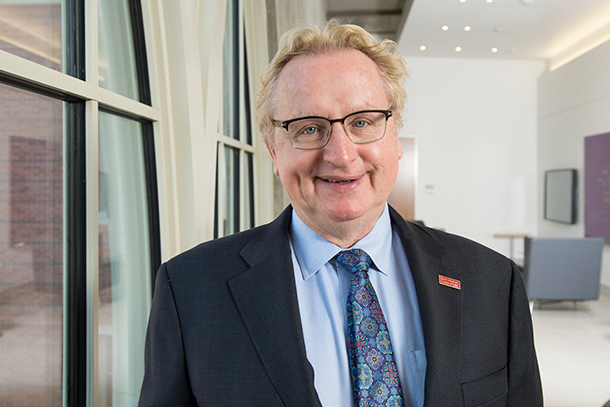Fellows of the Royal Society of London have included Sir Isaac Newton, Sir Charles Darwin, and Stephen Hawking. This week, a new name has been added to that exclusive list: USC professor and scientist Steve A. Kay, Provost Professor of Neurology and Biomedical Engineering and Biological Sciences, and director of the USC Michelson Center for Convergent Bioscience and the MESH Academy.
“We are thrilled that Dr. Kay is receiving this prestigious honor,” said USC Provost Michael W. Quick. “This is a remarkable recognition of his groundbreaking research and dedication to his field that is making a transformative impact on healthcare. It is a tremendous honor for him and for our university as a whole.”
The Royal Society of London is a fellowship of the world’s most distinguished scientists that was founded in 1660. Every year the Royal Society elects up to 52 new fellows. About 1,600 fellows and foreign members hold this distinguished title.
“It is humbling yet incredibly exciting to receive this recognition from my colleagues,” Kay said. “As a first-generation university student, I couldn’t have imagined this happening 30 years ago. There are so many people to thank: mentors, trainees, generous colleagues and a supportive family. I am particularly proud that much of this work was done here at USC.”
Cutting-edge research leads to Royal Society
Kay is one of the world’s top experts on the genetics and genomics of circadian rhythms, which serve as the body’s clock for timing the day-night cycle. His cutting-edge research led to an advancement in understanding human health and the development of potential life-saving biomedical devices and therapeutics. His laboratory contributed to our understanding of how the 24-hour clock in plants is used as a seasonal timer for correct flowering time. In human cells, Kay’s break-through research has led to the discovery of small molecule drugs targeting specific clock proteins. These drugs have potential as novel therapeutics for treating diseases including diabetes and cancer.
In announcing the new Fellows, the president of the Royal Society, Venki Ramakrishnan said: “Over the course of the Royal Society’s vast history, it is our fellowship that has remained a constant thread and the substance from which our purpose has been realized: to use science for the benefit of humanity.”
Further, Ramakrishnan said: “This year’s newly elected fellows and foreign members of the Royal Society embody this, being drawn from diverse fields of enquiry — epidemiology, geometry, climatology — at once disparate, but also aligned in their pursuit and contributions of knowledge about the world in which we live, and it is with great honor that I welcome them as fellows of the Royal Society.”
Celebrating Kay’s many credentials
Kay received his PhD from the University of Bristol in the U.K. He served as dean of biological sciences at the University of California, San Diego from 2007-2012 and president of the Scripps Research Institute from 2015-2016. He has also held faculty positions at The Rockefeller University, University of Virginia and The Scripps Research Institute. He served as the 21st dean of the USC Dornsife College of Letters, Arts and Sciences from 2012-2015. Among his other honors, Kay has also been elected as a member of the National Academy of Sciences and American Association for the Advancement of Science.
USC has one other fellow in the Royal Society: Andrew McMahon, Provost Professor of Stem Cell Biology and Regenerative Medicine and Biological Sciences at the Keck School of Medicine of USC, who was elected in 2007. The Royal Society honored his work for the powerful combination of biochemical, cellular, and genetic techniques to explain how signaling centers active during embryogenesis coordinate the differentiation and patterning of developing tissues and organs.
Kay will be officially admitted to the Royal Society on July 12 in London.
— Chandrea Miller


